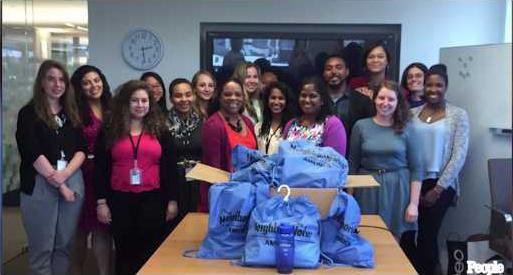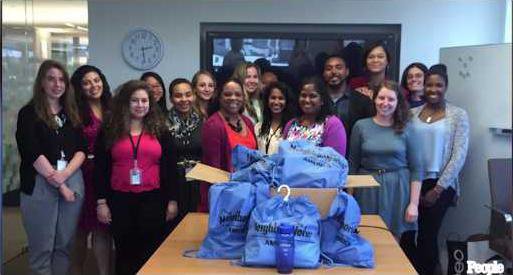The greatest gift Rob Scheer said he ever received was the death of his parents. He was the youngest of 10 children and endured both physical and sexual abuse.
My father would hold a gun to my or to my sisters head and ask my mother, Which one do you want me to shoot tonight?' he says. And that was just fun for them. They would drink and laugh.
When his parents died, Rob moved into the foster care system, where life didnt improve much. In foster care, Rob never felt loved or wanted. Everything he owned was kept in a trash bag.
More than 30 years later, he can still remember the contents of his trash bag: a used pair of pants and two stained shirts.
Rob was kicked out of his foster home at 18, where he spent the rest of his senior year living on the streets. During that time he had no one to turn to, he only had himself.
Upon graduation Rob made the decision to go into the military.
I didnt join the military because I loved my country, said Rob. I was going into it because I was hungry, I was cold, I was scared and I had nowhere to go.
He served as a yeoman (a petty officer who performs clerical duties) in the Navy for two years. He then started to work for a mortgage company, slowing making his way up until he was the senior vice president of the company. He met his husband, Reese, around that time.
Both Rob and Reese wanted children, so Rob started looking to adopt overseas.
The decision to adopt overseas didnt quite make sense to Reese.
Reese told Rob,You dont realize how many kids youre doing a disservice to by not telling them your story.
This hit Rob hard. So, the couple decided to foster to adopt in their local Washington D.C. area.
They first welcomed in 4-year-old Amaya and her 2-year-old brother Makai. When they met their two new children, Rob had a flashback to his childhood.
Amaya and Makai carried all of their belongings in trash bags
I looked at those bags and thought, 30 years later, we are still allowing kids to carry trash bags, Rob told People magazine. We put our garbage in trash bags. We discard our trash. Why would you treat a childs meager belongings like trash? A child whose life is crumbling around them? What a horrible thing to do to a child.
Rob put those trash bags in storage and then took his two children out to shop for new clothes, toys and hygiene products. Amaya didnt smile the whole day.
When they got home that night, Rob and Reese placed a few brand new nightgowns on Amayas bed.
She picked up one of the nightgowns and she tore the tag off. And she smiled for the very first time that entire day, said Rob. And I remember saying, Amaya, why are you smiling? and she looked at me and said Ive never owned a new nightgown.
Rob and Reese later fostered two brothers (2-year-old Greyson and 6-year-old Tristan), bringing their family of four to six.
Greyson and Tristan both arrived with trash bags as well, and Rob finally decided he was going find some other way for foster children to carry their belongings.
Thats when he created Comfort Cases.
Comfort Cases is a volunteer-based organization determined to provide backpacks with essential items like toiletries, pajamas, activities and other items for children in foster care.
Each item is carefully packed in a larger backpack and then donated to children entering the foster care system. Rob wants these cases to deliver the message that the world hasnt given up on foster children. He wants these children to know they are loved.
Rob said, Im really hoping that one day someone is going to look at me and say, You know what Rob, we are going to ban trash bags from ever being given to a child in foster care.
By the end of 2016, more than 25,000 Comfort Cases were donated to foster children in the Washington D.C. area. If you want to help more foster children receive these cases, you can donate here.
Rob knows what its like to be abused, abandoned and hungry. He knows what its like to have no place to turn. He knows what its like to not be loved. And he never wants another child to have to go through what he did.
Comfort Cases are just one way he lifts children's spirits and gives them the hope they desperately need.
My father would hold a gun to my or to my sisters head and ask my mother, Which one do you want me to shoot tonight?' he says. And that was just fun for them. They would drink and laugh.
When his parents died, Rob moved into the foster care system, where life didnt improve much. In foster care, Rob never felt loved or wanted. Everything he owned was kept in a trash bag.
More than 30 years later, he can still remember the contents of his trash bag: a used pair of pants and two stained shirts.
Rob was kicked out of his foster home at 18, where he spent the rest of his senior year living on the streets. During that time he had no one to turn to, he only had himself.
Upon graduation Rob made the decision to go into the military.
I didnt join the military because I loved my country, said Rob. I was going into it because I was hungry, I was cold, I was scared and I had nowhere to go.
He served as a yeoman (a petty officer who performs clerical duties) in the Navy for two years. He then started to work for a mortgage company, slowing making his way up until he was the senior vice president of the company. He met his husband, Reese, around that time.
Both Rob and Reese wanted children, so Rob started looking to adopt overseas.
The decision to adopt overseas didnt quite make sense to Reese.
Reese told Rob,You dont realize how many kids youre doing a disservice to by not telling them your story.
This hit Rob hard. So, the couple decided to foster to adopt in their local Washington D.C. area.
They first welcomed in 4-year-old Amaya and her 2-year-old brother Makai. When they met their two new children, Rob had a flashback to his childhood.
Amaya and Makai carried all of their belongings in trash bags
I looked at those bags and thought, 30 years later, we are still allowing kids to carry trash bags, Rob told People magazine. We put our garbage in trash bags. We discard our trash. Why would you treat a childs meager belongings like trash? A child whose life is crumbling around them? What a horrible thing to do to a child.
Rob put those trash bags in storage and then took his two children out to shop for new clothes, toys and hygiene products. Amaya didnt smile the whole day.
When they got home that night, Rob and Reese placed a few brand new nightgowns on Amayas bed.
She picked up one of the nightgowns and she tore the tag off. And she smiled for the very first time that entire day, said Rob. And I remember saying, Amaya, why are you smiling? and she looked at me and said Ive never owned a new nightgown.
Rob and Reese later fostered two brothers (2-year-old Greyson and 6-year-old Tristan), bringing their family of four to six.
Greyson and Tristan both arrived with trash bags as well, and Rob finally decided he was going find some other way for foster children to carry their belongings.
Thats when he created Comfort Cases.
Comfort Cases is a volunteer-based organization determined to provide backpacks with essential items like toiletries, pajamas, activities and other items for children in foster care.
Each item is carefully packed in a larger backpack and then donated to children entering the foster care system. Rob wants these cases to deliver the message that the world hasnt given up on foster children. He wants these children to know they are loved.
Rob said, Im really hoping that one day someone is going to look at me and say, You know what Rob, we are going to ban trash bags from ever being given to a child in foster care.
By the end of 2016, more than 25,000 Comfort Cases were donated to foster children in the Washington D.C. area. If you want to help more foster children receive these cases, you can donate here.
Rob knows what its like to be abused, abandoned and hungry. He knows what its like to have no place to turn. He knows what its like to not be loved. And he never wants another child to have to go through what he did.
Comfort Cases are just one way he lifts children's spirits and gives them the hope they desperately need.





